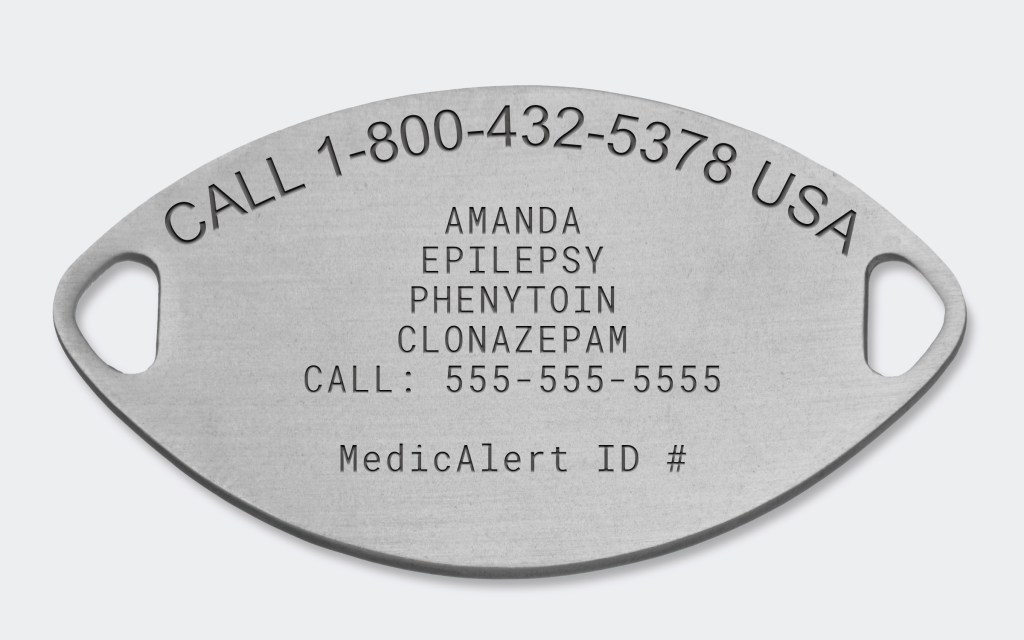MedicAlert saved my life! First Responders recognized my bracelet. MedicAlert relayed my digital health profile to help the ER doctors respond properly to my seizures.
Dan D., MedicAlert member

Medical IDs for Seizure Medications
The confidence to live with seizure medications
Epilepsy is one of the world’s oldest recognized conditions. Affecting around 50 million people worldwide, it is also one of the most common neurological diseases globally. There are many symptoms associated with epilepsy. The main symptom, however, is repeated seizures. When a seizure occurs, a person may experience confusion, tremors, difficulty breathing, and other symptoms. Fortunately, many people living with epilepsy can dramatically decrease the frequency of seizures or they can become completely seizure free after a few years of proper treatment with seizure medications.
While the benefits of using seizure medications far outweigh the risks, these medicines can produce different patterns of side effects, they can interact with other drugs, and they can even interact with certain foods and drinks.
Because epilepsy is a serious medical condition and seizure medications aren’t without risk, people who are living with epilepsy and using seizure medications should wear a MedicAlert medical ID for seizure medications.
How MedicAlert protects those living with a seizure medications
One thing you shouldn’t worry about is what could happen if there’s an emergency. MedicAlert’s protection plans offer benefits that extend beyond the ID, providing safety and peace of mind for people living with seizure medications, their families and caregivers.

24/7 Emergency Response
Our team provides first responders the information they need to provide fast, accurate care.

Digital Health Profile
All your vital information, all in one place for you and your caregiver.

Emergency Contact Notification
In an emergency, we connect families so that no one is alone in a crisis.

Patient Instructions
Share the information that’s important to your care, such as use of rescue medications or contraindication for tests like MRIs.
Pair a medical ID for seizure medications with the protection plan that’s right for you.
What exactly are seizure medications?
There are more than 30 different prescription seizure medications on the market today. Also called anti-seizure drugs, anti-seizure medications (ASMs), and anti-epileptic drugs (AEDs), seizure medications help prevent or stop epileptic and other seizures by reducing the abnormal electrical brain activity that causes them. They work by affecting the way neurotransmitters send messages throughout the body and by changing how ions move in and out of brain cells.
Seizure medications are usually taken orally in the form of tablets, capsules, liquids, or syrups. They can also be administered by injection (into the muscle, vein, or just under the skin), or by suppository (inserted into the rectum). Some ASMs are used alone, while others are taken in combination with other seizure medications.
Common seizure medications include:
- Benzodiazepines, such as clonazepam (Klonopin)
- Carbamazepine (Tegretol)
- Divalproex sodium (Depakote) and valproic acid (Depakene)
- Gabapentin (Neurontin)
- Lamotrigine (Lamictal)
- Levetiracetam (Keppra)
- Phenytoin (Dilantin)
- Tiagabine hydrochloride (Gabitril)
There are a number of newer seizure medications on the market that can help treat epilepsy and other conditions that cause seizures, but with fewer side effects. Examples include:
- Cannabidiol (Epidiolex)
- Cenobamate (Xcopri)
- Oxcarbazepine (Oxtellar XR, Trileptal)
- Pregabalin (Lyrica)
- Topiramate (Topamax)
According to the latest estimates by the Centers for Disease Control and Prevention (CDC), 1.2% of the total U.S. population had active epilepsy in 2015. This means, around 3.4 million people nationwide were living with epilepsy, including three million adults and 470,000 children aged 0-17.
While seizure medications can’t cure epilepsy, they help control seizures in 70% (or 2.38 million) of people living with epilepsy.
For which conditions are seizure medications prescribed?
Seizure medications are the first line of treatment for most individuals diagnosed with epilepsy. While seizure medications are highly effective, not all medications work for all types of seizures and all people living with epilepsy. In these cases, it may take time and a more customized approach to determine the best medication and dosage for the individual.
To diagnose epilepsy, your doctor will begin by assessing your symptoms and medical history. This often includes a neurological exam that could help determine the type of epilepsy you may have, and blood tests to check for genetic conditions, infections, or other conditions that may be associated with seizures.
Because epilepsy causes changes in the normal pattern of brain waves, even when an individual is not having a seizure, doctors can use an electroencephalogram (EEG) test to record the electrical activity in the brain. This is the most common test used to diagnose epilepsy. Other diagnostics doctors may use to help diagnose epilepsy include:
- Computerized tomography (CT) scan
- Magnetic resonance imaging (MRI)
- Functional MRI (fMRI)
- High-density EEG
- Positron emission tomography (PET)
- Single-photon emission computerized tomography (SPECT)
- Subtraction ictal SPECT coregistered to MRI (SISCOM)
Neuropsychological tests to assess your thinking, memory, and speech skills can also help doctors determine which areas of the brain are affected.
What to engrave on your MedicAlert medical ID for seizure medications:
MedicAlert offers free custom engraving on all our seizure medication bracelets and medical ID products. Engravings on medical IDs for seizure medications should include any critical medical information that can protect and save lives in an accident or medical emergency, for example:
- Epilepsy, seizures
- Anti-seizure medication(s)
- Drug interactions
- Designated physician information
- Emergency contact information

Sample engraving. Consult our team if you need help engraving your medical ID for seizure medications.
What are the advantages of seizure medications?
Seizure medications are highly effective at controlling seizures in 70% of people with epilepsy. While ASMs can cause side effects, they are mostly mild and reversible.
What are the potential side effects from seizure medications?
While seizure medications have many benefits, they can interact with many common prescription drugs and over-the-counter (OTC) medications. ASMs can also prevent some medicines from functioning properly, and other medicines can have the same effect on seizure medications.
ASMs can cause a number of side effects as well, including fatigue, dizziness, and weight gain. These common side effects are usually mild. Rare side effects include mood disruption, skin rash, loss of physical coordination, extreme fatigue, and speech problems. These rare, but dangerous, side effects require immediate medical attention.

MedicAlert Foundation is proud to partner with the Epilepsy Foundation to raise awareness of epilepsy and promote seizure first aid training for first responders and anyone affected by seizure disorders.
How should you manage the use of seizure medications?
Seizure medications are not for everyone. Pregnant people and women using contraceptives should weigh the pros and cons of using seizure medication with their doctor. In pregnant women, certain ASMs can cause birth defects such as spina bifida. In women using contraceptives, some seizure medications can alter the effectiveness of this form of birth control.
In some people living with epilepsy and other conditions that cause seizures, seizure medications aren’t effective. In these cases, several other treatments might be effective. They include:
- Brain surgery to remove a small part of the brain that’s causing the seizures
- Vagus nerve stimulation (VNS) therapy, which involves implanting a small electrical device under the skin that sends electrical impulses to the brain to help reduce the number of seizures or decrease the severity of them
- Ketogenic diet, one of the oldest treatments for epilepsy, involves consuming high-fat foods and very few carbohydrates
How medical IDs for seizure medications combined with MedicAlert Membership provide peace of mind
If you have epilepsy and use seizure medications, a MedicAlert medical ID for seizure medications can protect you in an emergency and other medical situations. A MedicAlert medical ID lets emergency responders know that you are living with epilepsy and taking seizure medications, so certain drugs and other substances can be avoided. Add a MedicAlert protection plan, and you will have an added layer of protection in emergencies and other health-related situations.
If you are living with epilepsy and using seizure medications, a MedicAlert protection plan can help ensure accurate and fast care by delivering detailed information about your condition and medications to emergency responders, doctors, and hospital staff. This will help ensure that your healthcare team knows that you are living with epilepsy and taking seizure medications.
- We’re your voice: If you can’t speak for yourself due to a medical emergency, your ID will speak for you – informing others about your seizure medication and any other medications you’re taking.
- 24/7 emergency protection: In an emergency, the MedicAlert team will relay all of your critical medical information to first responders, no matter where or when your emergency happens.
- Always connected: You should never be alone in an emergency. That’s why MedicAlert will reach out to your designated contacts if you are unable to do so.
- Live with peace of mind and confidence: MedicAlert will be there for you every step of the way. You’ll have the confidence and freedom to live your life with seizure medications, knowing we’ve got you covered.
DISCLAIMER: THIS WEBSITE DOES NOT PROVIDE MEDICAL ADVICE. The information in this article is presented for educational purposes only and is not intended as a substitute for professional medical advice, diagnosis and treatment. Always seek the advice of a physician or other qualified healthcare provider for any questions you may have regarding a medical condition or treatment.







